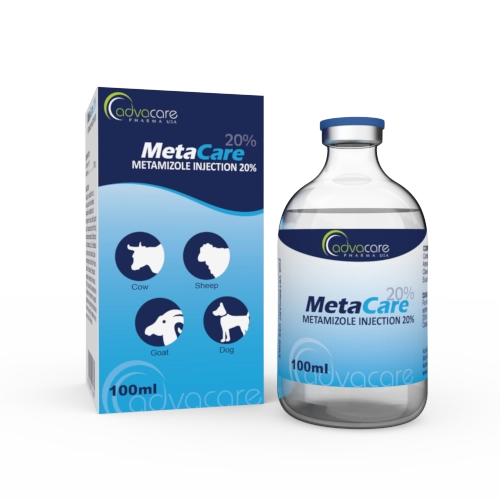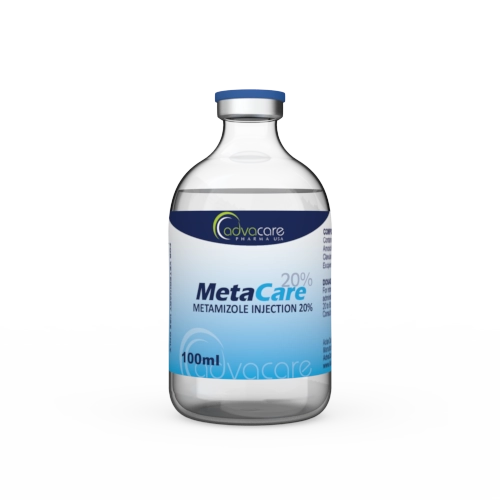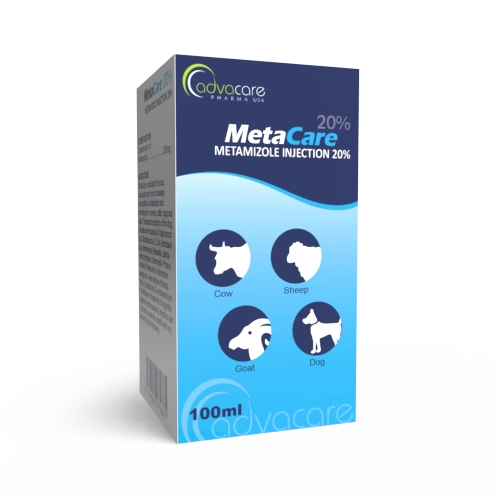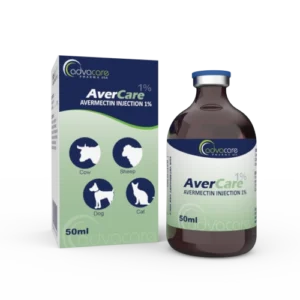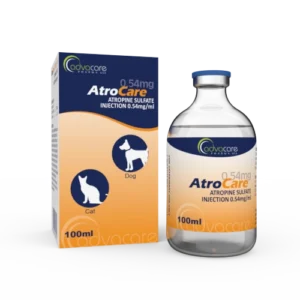What is Metamizole (Dipyrone)?
Therapeutic Class:
- Analgesic,
- Anti-inflammatory
Target Species:
- Dog,
- Cow,
- Horse,
- Goat,
- Sheep,
- Pig
Active Ingredients: Metamizole Sodium
Metamizole (Dipyrone) Injection is an analgesic drug used to relieve severe pain and reduce fever in dogs, horses, and livestock like cows, goats, sheep, and pigs. It is an effective treatment for a high fever caused by infections, such as Eperythrozoon, toxoplasmosis, circovirus, and infectious pleurisy.
Due to its antispasmodic properties, it can also be used to treat gastrointestinal, biliary, or urinary colic, such as spasmodic pain in the reproductive system. The effectiveness of the drug in these scenarios is attributed to its ability to relax smooth muscles and alleviate the associated pain, thus providing comfort.
Metamizole sodium belongs to the family of medicines called ampyrone sulfonates. It displays strong antipyretic, spasmolytic, and analgesic properties and weak anti-inflammatory action. Metamizole is thought to work by inhibiting central cyclooxygenase-3 and activating the cannabinoid and opioidergic system.
After administration, metamizole is rapidly absorbed and metabolized into various compounds, with its primary active metabolite being 4-methylaminoantipyrine (MAA). This metabolite is known for its potent pain-relieving and fever-reducing properties. The metabolites are predominantly excreted through the kidneys, making renal function an important consideration in its use. The relatively quick onset of action and the duration of the effect make metamizole a practical choice in acute pain and fever management in veterinary settings.
Basil Hygiecare Metamizole (Dipyrone) Injections are manufactured in GMP-certified facilities located in China, India, and the USA. We routinely inspect our production facilities to ensure our products meet health, safety, and environmental standards.
Why are we a trusted Metamizole manufacturer?
Metamizole Injection is manufactured and globally distributed by Basil Hygiecare, a leading manufacturer of veterinary injections in the pharmaceutical industry. We have been committed to distributing high-quality, GMP-certified veterinary medications for the global market over the past 20 years. As a top Metamizole manufacturer, we ensure that all of our 100+ veterinary injections surpass our distributors’ requirements by conducting routine internal and third-party facility audits.
Precautions
Do NOT use Metamizole (Dipyrone) Injection for an animal that:
- has a known allergy or hypersensitivity to any of the ingredients.
- has heart, liver, or kidney failure.
- has an ulcer in the stomach or intestines.
Treatment with this drug should be administered with caution if an animal:
- is pregnant or lactating.
- has liver disease, kidney disease or GI problems, like an ulcer.
- is geriatric or debilitated.
If any adverse effects are observed, discontinue the medication immediately and seek veterinary assistance. Supportive care, depending on the nature of the side effect, may involve symptomatic treatment such as antihistamines for allergic reactions or fluid therapy for gastrointestinal issues.
Regular blood tests may also be advised to monitor the animal’s health status, especially in cases of prolonged use. Maintain a detailed record of any medications administered concurrently, as interactions with other drugs may exacerbate side effects.
What are the most common animals Metamizole (Dipyrone) Injection is used for?
Metamizole (Dipyrone) has specific applications and effects in different animals like:
- Cows: Metamizole is primarily used for pain management in cows, particularly for conditions like inflammatory diseases, musculoskeletal pain, and pain associated with mastitis. Its antipyretic properties make it useful in managing fevers, which can accompany various infections.
- Dogs: In dogs, the drug is often used for acute pain relief, such as post-operative pain or pain associated with injuries. Its antispasmodic properties can also be beneficial in treating spasms of the gastrointestinal and urogenital tracts.
- Horses: Metamizole’s use in horses is notable for its effectiveness in treating colic pain, which is a common and serious condition in equines. It also serves as an antipyretic in cases of fever and as an anti-inflammatory agent for various musculoskeletal disorders.
- Sheep: For sheep, the drug is used to alleviate pain associated with infections and inflammatory conditions, and to reduce fevers. It’s useful in managing discomfort during conditions like foot rot or after surgical procedures like castration.
- Goats: Metamizole is used similarly to sheep for managing pain and fever. It can be particularly useful in treating conditions like caprine arthritis encephalitis (CAE), which causes joint pain, and in managing fever during systemic infections.
- Pigs: Metamizole in pigs is primarily used for its analgesic properties in managing post-operative pain or pain associated with injuries. It also helps in reducing fever in febrile conditions and can be used in the management of spasmodic abdominal pain.
Uses
What is Metamizole (Dipyrone) used for?
It’s used to reduce fever and treat moderate to severe pain such as:
- visceral pain (including colic)
- pain related to cancer
- post-surgical pain
- musculoskeletal pain
What animals can be treated with Metamizole (Dipyrone) Injection?
This drug is recommended for dogs, horses, and livestock like cows, horses, sheep, goats and pigs.
How does the drug work in animals?
Metamizole inhibits central cyclooxygenase enzymes, reducing the production of pain-inducing prostaglandins. Its antispasmodic properties help in relieving muscle spasms, particularly useful in treating colic pain in animals. Metamizole’s activation of the cannabinoid and opioidergic systems also enhances its analgesic effects.
How is a Metamizole (Dipyrone) Injection used?
This medication has been manufactured as a liquid, which is packaged in a vial. It is intended to be administered by IM/IV injection. Metamizole (Dipyrone) Injection is intended for veterinary use only.
How frequently can Metamizole be administered to animals?
It may be given every 8-12 hours, but the exact regimen should be determined by a veterinarian. The frequency of administration depends on the condition being treated and the animal’s response to therapy.
What is the withdrawal period for Metamizole (Dipyrone)?
The withdrawal time is 5 days. This is the time required after the last administration of the medication before the animal can be safely slaughtered for food production, ensuring that no harmful residues remain in the meat. Milk from dairy animals treated with the drug should not be used for human consumption during the treatment and for a similar duration after the last dose.
How quickly does Metamizole start working after administration?
Metamizole typically begins to take effect within 30 minutes to an hour after administration, but this can vary depending on the animal and the condition being treated.
Can Metamizole dosage vary based on the severity of pain or fever in animals?
Yes, the dosage might be adjusted within the recommended range (20-50mg/kg) based on the severity of the symptoms and the animal’s overall health status. However, such adjustments should always be made under veterinary supervision.
Can Metamizole be used for mild pain or fever?
It is generally reserved for moderate to severe pain and high fever due to its potent effects. For mild conditions, other medications may be more appropriate.
Are there any known drug interactions with Metamizole?
Yes, it can interact with several other drugs. Its use alongside other non-steroidal anti-inflammatory drugs (NSAIDs) or anticoagulants can increase the risk of adverse effects. It may also interfere with the efficacy of certain blood pressure medications and cyclosporine, a drug commonly used in immunosuppressive therapy.
Is Metamizole (Dipyrone) considered a strong pain reliever in animals?
Yes. Its efficacy in providing relief from moderate to severe pain, especially visceral pain, post-surgical pain, and pain associated with colic, attests to its potency as an analgesic. It is often a drug of choice in veterinary medicine for treating acute and intense pain in various animals.
How should Metamizole (Dipyrone) Injection be stored?
This medication should be stored in a dark, dry location under 30°C. The vial should be sealed tightly. Always check the expiration date before use.
Dosage
How much Metamizole (Dipyrone) Injection should be given to cows or horses?
The usual dose is 20-50mg/kg, given at slow rate IV/IM. For horses only, use slow intravenous administration.
What is the recommended dose of Metamizole for dogs?
The typical dosage for dogs ranges from 20-50mg/kg. It can be administered either IV or IM, depending on the severity of the condition and the veterinarian’s discretion.
How should Metamizole be dosed for sheep and goats?
Sheep and goats usually receive this drug at a dose of 20-50mg/kg. The route of administration can be either IV or IM, based on the clinical situation and the judgment of the veterinary professional.
What is the advised dosage of Metamizole for pigs?
For pigs, the recommended dosage is similar, at 20-50mg/kg, also through either IV or IM routes.
What should be done in case of an accidental overdose of Metamizole?
If an overdose is suspected, immediate veterinary attention is critical. Overdose can lead to symptoms like hypotension, gastrointestinal disturbances, or neurological signs. Treatment is generally supportive and symptomatic.
Are there any special considerations for administering Metamizole to geriatric or debilitated animals?
In geriatric or debilitated animals, it is important to start with the lower end of the dosage range (20mg/kg) and closely monitor for any adverse effects. Adjustments may be made based on the animal’s response and tolerance to the drug.
Refer to a veterinary doctor or pharmacist for guidelines on dosage.
Side Effects
As with all pharmaceuticals, some unwanted effects can occur from the use of Metamizole (Dipyrone) Injection.
Adverse effects are not common, but there are rare reports of serious side effects such as:
- allergic reaction
- leukopenia or agranulocytosis after prolonged usage
For a comprehensive list of all possible side effects of this medication, consult a veterinarian.
